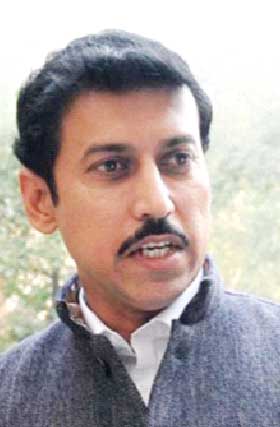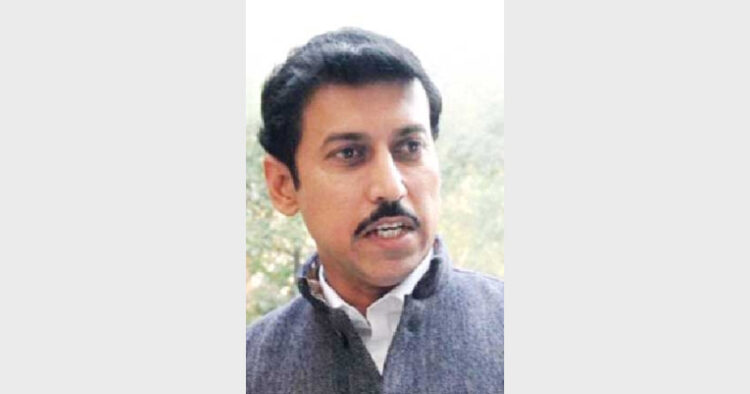 In the history of Indian politics, Colonel Rajyavardhan Singh Rathore is the first sportsperson to head the Sports Ministry. On the backdrop of ongoing FIFA U-17 World Cup, he spoke to Organiser Correspondent Nishant Kr Azad, about the future of Soccer in India and the programmes, ideas on which his Ministry is working to implement Prime Minister Narendra Modi”s vision of developing a sporting culture. Excerpts:
In the history of Indian politics, Colonel Rajyavardhan Singh Rathore is the first sportsperson to head the Sports Ministry. On the backdrop of ongoing FIFA U-17 World Cup, he spoke to Organiser Correspondent Nishant Kr Azad, about the future of Soccer in India and the programmes, ideas on which his Ministry is working to implement Prime Minister Narendra Modi”s vision of developing a sporting culture. Excerpts:
India is hosting any FIFA tournament for the first time. How do you see this?
This is for the first time India is hosting a FIFA World Cup tournament and also for the first time India is participating in a FIFA World Cup tournament. Public response has been
overwhelming and the timing of the event is also very good, as both amateur and professional leagues are also getting on to higher trajectory in the country. India has also bid for FIFA U-20 World Cup for 2019.
India has hardly an international name in the game. How do you propose to attain international standards?
India has many advantages by virtue of the huge
demographic dividend it enjoys. What we need to do is to
popularise the game at the grass roots level and put in place appropriate systems and structures for talent
identification and development. This could include, among other things, setting up nurseries, Regional and State levels academies; National level academies and a National Training Centre for Football. A massive coach education programme for developing community coaches, development coaches and high priority coaches is equally important. The same applies to the development of technical officials.
What is ‘Khelo India’ initiative?
Khelo India is an all-encompassing programme, which aims at impacting the entire sports ecosystem in terms of facility development and management; community sports; talent identification development; strong domestic competition structure; etc.
PM Modi has mentioned about development of a sporting culture in India. Any plans on that front?
The Prime Minister has given a major boost to sports development in the country by approving a National Sports Development Programme called ‘Khelo India’. It is for the first time that we would have a Pan India Scholarship for the most talented sportspersons under the age of 18 years. They would be given a financial support for the long term development. Every sportsperson selected under the scheme would be entitled to receive an annual scholarship worth Rs 5 lakh for 8 consecutive years subject to meeting the performance benchmarks.
Any plans to identifying and nurturing the new talent?
Apart from the scholarship scheme, we are planning to introduce a robust National School Games and National University Games in partnership with the National Sports Federations. This would serve as a platform at the national level for identifying new talent. The maximum emphasis will be on the highest level of technical conduct and also
reaching out effectively to the target group. We have also launched a National Sports Talent Search Portal.
What new future priorities in coming days?
There are many priorities that we are working upon. The first is to bring the athletes to the centre stage. It is also important to improve the sports governance in the country for which liberal assistance will be given to the Federations for capacity development.
There are also the issues of professionalism and accountability in sports management. How are you planning to tackle this?
Among the various measures planned for strengthening the National Sports Federations, the most important initiative is to provide financial support to the federations for hiring professionals, such as CEO, High Performance Director, Talent Development Manager, etc. In addition, there is a proposal to introduce performance based
funding.
But most of the sports bodies are headed by non-
sportspersons?
The Government is in the process of finalising a revised National Sports Code, which will look into all these matters. One of the suggestions is to make it mandatory to have 25 per cent athletes’ representation on the Executive Committee of each National Sports Federations.
Any ideas on utilising technology in galvanising sports?
Technology has a huge role in sports development. Some of the areas where we propose to use it include a GIS based information
system on sports infrastructure throughout the country; athlete monitoring system; mobile apps for sports education; etc
The sports infrastructure is another area where lot needs to be done.
While we do lack modern sports infrastructure, especially in rural areas, it is equally important to ensure optimal utilisation of theexisting infrastructure. Hence, we will
follow two-pronged approach for filling up critical infrastructure gaps and ensuring optimal utilisation of the existing infrastructure.
Any specific sports that you would focus on?
There are many high priority sports that have been identified for competing at the continental and the world level. These include both team and individual games. Some of the important sports disciplines include Hockey, Shooting, Boxing, Wrestling, Badminton, Athletics and Archery.
Sportspersons generally have a short span of career and a very bleak future after retirement. This has been a major psychological barrier in choosing sports as a career. A sportsperson who is now a Minister, how do you plan to address this?
It is important for sportspersons to have financial security. The Government already has a pension scheme for meritorious sportspersons. We are also working with the Department of Personnel & Training for enhancing quota for sportspersons. Separately there is a proposal to provide Cashless Medical Insurance to National Sports Awardees.













Comments